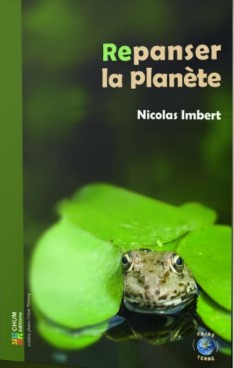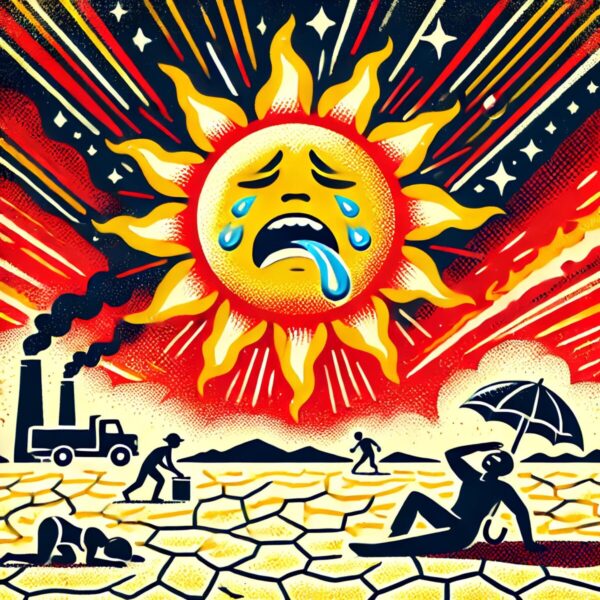Green Cross International is a non-governmental organization (NGO) founded following the Earth Summit in Rio de Janeiro, Brazil in 1992. This United Nations conference, which brought together 120 heads of state and government and 189 countries, is considered the starting point of global awareness of the climate and ecological emergency. Since then, 32 years have passed and for the Executive Director of Green Cross International, Nicolas Imbert, the climate and ecological emergency is still present. Remaining passive is no longer an option.
Now is the time for us to act to get out of the deadlock and transform our economy and our lives for the better. How? By taking control of our food, preserving water, the ocean, and energy, and managing territories. But before acting (coming up #2), we must understand!
# 1 Analyze the situation
Understanding life expectancy
The combined efforts of medicine and human development in our societies have made it possible to make progress in the quality of life from the 19th to the 21st century that we probably would not have dared to hope for a hundred and fifty years ago. Today, life expectancy in Europe is stagnating or slightly declining. More specifically, healthy life expectancy is declining across the population, and this is happening even more rapidly when there is a significant remaining life expectancy.
In other words, the younger you are, the less likely you are to live in good health for as long as your parents. Each and everyone can now perceive the effects of climate change in their daily lives with alternating droughts, floods, and extreme weather events, increasingly frequent and severe in their effects. Everywhere on the planet, shortages or structural difficulties in preserving vital resources are now part of daily life, whether it be food, water, or biodiversity, as planetary boundaries are reached or exceeded.
Understanding the grip on the planet
The post-war generation in the West massively reached political, economic, and media power in the 1980s and 1990s. Its representatives have chosen to sustain themselves there permanently through what is now materializing as a triple hold-up on the planet and future generations.
Geographical hold-up, first and foremost. By keeping the rest of the world under economic and ideological domination, these decision-makers have built, through their actions and way of life, a network of modern slavery serving their interests. Without it being planned or coordinated, a thirst for travel and discovery supported by a spirit of mass consumption has turned every current Western actor into a cog in this geographical hold-up.
Diplomatic hold-up, under the guise of supporting the growth of developing countries in a colonial mindset, so-called development aid organizations (IMF, World Bank, multilateral aid) threaten their agriculture and livelihood, make their industry vulnerable, and their workforce precarious, for the greater benefit of Western banks and at the cost of high corruption. This means, for Westerners, living on credit from poorer states and their own children [...]
Understanding our vulnerabilities
We perceive in our daily lives post Covid-19, and as climate change becomes more noticeable every day in the daily lives of the French, how essential the rapid transformation of our societies is. And we understand that we must finance it with the wealth now available to prevent the continuation of this credit hijacking from making it completely impossible to carry out.
However, historians, sociologists, or geographers will probably show, as screenwriters have started to do, how the 20th century will have been the century of dangerous ideologies, the myth of the ability to industrialize everything, and a lack of integration of limits. The concept and realization of a nuclear power plant are a perfect illustration of this. Upon the discovery of a useful atomic property for humanity, an ideological addiction to chain reaction phenomena emerged, allowing the creation of bombs and centralized energy devices, without anticipating the consequences. Thus, to justify the race for the supposed magnificence of nuclear weapons, a small number of countries (less than 8 out of 197 now) decided to use this energy from the atom to, at the cost of huge investments, create boiling water to turn a turbine to produce electricity. All this, starting from an ore whose resource, life cycle, and externalities of the extraction process are not geographically, politically, or technically controlled. All this in the name of energy autonomy, without any reality check.
This willingness to act for military reasons, and the lack of associated public debate, have allowed massive investments and the reckless mobilization of public research resources. An entire sector has self-convinced itself to invest in oversized means of transportation and distribution, hindering the deployment of renewable energies or any energy efficiency policy [...]
Understanding Environmental Health
Environmental health and prevention are two particularly neglected subjects in France. Europe, however, establishes a structuring framework for these public policies, especially with the concept of One Health, which develops a policy that is both ambitious and integrated, coherent between environmental, food, public health, preventive medicine, curative medicine, consideration of dependency, disability, and old age issues. In a recent book, The Right Care, Dr. François-Georges Carissimo demonstrates how adjusting healthcare services to each individual's needs is not only more economically efficient but also fosters social cohesion and respects human dignity.
Indeed, the recent alerts are numerous, linked to the proliferation of endocrine disruptors in our food and daily lives. French agriculture remains entangled in a dependence on glyphosate, contrary to history, while obesity and overweight, new social markers, are spreading. Water and soil pollution should, however, urge us not to consider environmental regulations as optional. Instead, we should further align our country with the European trajectory of consumer protection and leading the fight against the climate emergency. This is what the Paris Agreement resulting from the 21st Conference of the Parties on Climate Change (COP 21) led us to hope for in 2015. [...]

Excerpts from the book "Rethinking the Planet." Its author Nicolas Imbert is a French engineer, executive director of the NGO Green Cross. He works on structuring civil society proposals on climate, environmental health, territorial resilience, and the prevention of environmental conflicts, in France and internationally.

Illustration of One: From this conversation, the AI generated a flow of illustrations. Stefan Muntaner fed it with editorial data and guided the aesthetic dimension. Each illustration thus becomes a unique work of art through an NFT.
